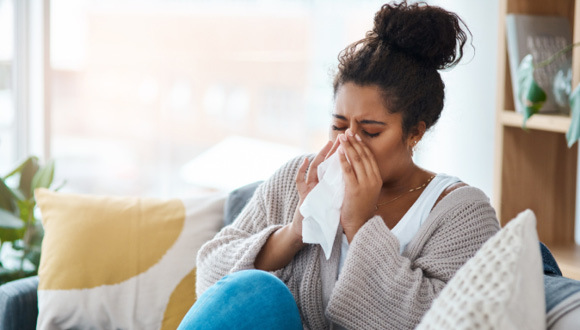Experts Say the Spring 2022 Allergy Season Will Be a Bad One — Here's What You Need to Know
March 25, 2022 - Katie McCallumLook no further than the oak trees outside your home or office and you'll know what time of year is coming our way.
Pollen has already started to accumulate, leading to a noticeable uptick in sniffs and sneezes. Much more is expected to follow suit in the coming weeks.
"Unfortunately, we're expecting a bad allergy season in Houston this year — especially this coming April," says Dr. Omar Ahmed, an ENT doctor at Houston Methodist.
It's not just Houston. Dr. Ahmed notes that allergy seasons are getting longer and worse across the country.
In Houston, the primary reason this season is predicted to be so bad is the relatively mild winter we just experienced.
"With a warmer winter comes a longer growing season for trees and grasses that produce pollen, meaning a higher concentration of pollen for us to deal with as it begins to bloom," says Dr. Ahmed. "Pollen counts actually started rising as early as January, but more is coming in April and people should be prepared for that."
Dr. Ahmed's advice for handling a bad allergy season? Plan ahead.
"One of the best ways to deal with allergy season is to get ahead of it — taking steps to prevent allergy symptoms and knowing how to treat them if they do arise," says Dr. Ahmed.
Start by checking local pollen counts on your weather app and considering how the day's pollen levels might affect your outdoor plans.
"Pollen counts are typically highest in the morning, so it's generally a good idea to keep windows and doors closed as much as possible during this time," explains Dr. Ahmed. "And if counts are high and you need to be outdoors, wearing a mask can reduce the amount of pollen you breathe in."
Still, allergy symptoms may strike, and Dr. Ahmed's preferred first step might surprise you.
"The most important thing is to use a saline nasal rinse," Dr. Ahmed recommends. "This helps wash away the pollen particles that have deposited in your nose."
You can purchase saline rinse kits at grocery stores and pharmacies. Just be sure that you mix the saline packets with sterile water, such as distilled water, bottled water or water that's been boiled and allowed to cool to a safe temperature.
"Taking an antihistamine can also help lessen some allergy symptoms, including scratchy throat, sneezing, nasal congestion and itchy eyes," says Dr. Ahmed.
(Related: Stuffed Up? Some Nasal Decongestant Sprays Can Cause Congestion of Their Own)
And for those who are prone to seasonal allergies, now's the time to start your seasonal allergy treatment regimen if you haven't already.
"People who suffer from allergic rhinitis, which is the term for seasonal allergies, may consider starting a steroid nasal spray to help pretreat early symptoms," Dr. Ahmed explains. "These sprays take a few days to take effect, so you want to begin using them in anticipation of your symptoms."








